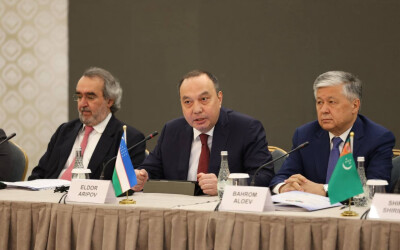ISRS hosted a meeting with delegations from Bahrain and Oman

On April 27 of this year, meetings were held between the Director of the Institute for Strategic and Regional Studies under the President of the Republic of Uzbekistan (ISRS) Eldor Aripov and representatives of the delegations of the Kingdom of Bahrain and the Sultanate of Oman.
The negotiations took place on the eve of the First Central Asia –the Gulf Cooperation Council (GCC) Think Tank Forum, which starts on April 28 in Tashkent and will become an important platform for deepening expert dialogue between regions.
During a conversation with the Director of the leading Bahraini Center for Strategic, International and Energy Studies (Derasat) Abdulla Mohammed Al-Ahmed, the prospects for the development of Uzbek-Bahraini relations were discussed.
Derasat is a Bahraini think tank founded in 2009. The center specializes in research in the fields of strategic security, international relations, and energy, and promotes public policy and expert dialogue on key regional and global issues. According to the Global Go To Think Tank Index, the center is ranked among the top 25 think tanks in the Middle East and North Africa.
Taking the opportunity, ISRS Director Eldor Aripov congratulated Abdulla Mohammed Al-Ahmed on his recent appointment and expressed confidence that his extensive experience and high professionalism will contribute to the development of the Derasat center and the expansion of international cooperation.

In turn, the head of Derasat highly appreciated the strategic initiatives of Uzbekistan, noting that the organization of such a large-scale EU-CA summit in Samarkand became a clear evidence of the strategic vision of the leadership of Uzbekistan. "The forum not only confirmed the increased authority of Uzbekistan in the world arena, but also demonstrated its key role in the development of multilateral cooperation," the expert added.
A separate topic of the meeting was the establishment of links between the think tanks of the two countries. The following were identified as key areas of interaction: activation of expert exchange programs, regular holding of thematic forums and conferences, as well as joint preparation of analytical publications on the most pressing issues on the bilateral agenda. It was emphasized that the implementation of these initiatives will make a significant contribution to deepening partnership relations between the countries.
Following productive talks with the Bahraini delegation, Eldor Aripov also met with the Omani delegation, consisting of the Dean of the Faculty of Political Studies and Economics at Sultan Qaboos University, Dr. Almukhtar Saif Al-Abri and Professor Ahmed Bin Hamed.
The analytical center at Sultan Qaboos University is the country’s leading think tank. It provides advice and innovative solutions to the public and private sectors to help address key challenges. Focuses on research and innovation in line with Oman 2040, contributing to sustainable development and public policy.

In the context of discussing the deepening of bilateral cooperation, Almukhtar Saif al-Ibri praised Uzbekistan's foreign policy, emphasizing that the country is demonstrating an active and dynamic role in the international arena. "Uzbekistan is actively developing its economy, demonstrating sustainable growth, and is also expanding cooperation with countries around the world," the guest said.
During the meeting, the parties paid special attention to the prospects for scientific and analytical cooperation, focusing on the potential for partnership in key sectors. The interlocutors acknowledged that effective interaction in the areas of economy, transport, energy and human capital will contribute to the sustainable development and prosperity of the regions of Central Asia and the GCC. To this end, they expressed their readiness to sign a Memorandum of Understanding, which provides for joint research, organization of conferences and publication of analytical materials on topical issues of bilateral and regional cooperation.
Overall, the meetings clearly demonstrated the interest of Uzbekistan, Oman and Bahrain in expanding cooperation, both bilaterally and within the framework of the Central Asia – GCC dialogue. The participants attached particular importance to coordinating the efforts of analytical centers that can become a driving force in developing interregional partnership.
Next

The First Central Asia –the Gulf Cooperation Council (GCC) Think Tank Forum on the topic: “Strengthening Strategic Partnership: From Historical Ties to Comprehensive Cooperation” has started in the capital of Uzbekistan today.
28.04.2025





